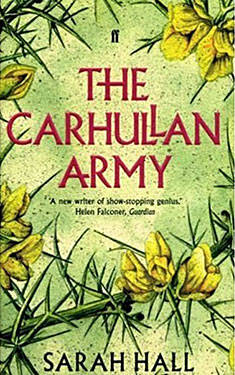Completed 4/6/2020,
Reviewed 4/6/2020
4 stars
This is one
of the best dystopian novels I’ve read in a long time. I thought it was very well written and nicely
paced. It’s about a woman who trades life
in the oppressive near-future northern England for an almost equally dystopian
women’s commune somewhat hidden in the hills.
I don’t remember how many chapters there are but it’s divided into four
basic parts: the escape, the arrival, life
in the commune, and the end. Each part
seemed like just the right length to keep the novel moving without going too
fast or too slow. I liked that the
commune she runs to isn’t the utopian ideal as in several of the books I’ve
read, especially the older ones. It’s
just as dark and gritty as the place she escaped from. This book was nominated for the several awards,
including the Gaylactic Spectrum Award for positive depictions of LGBTQ+ characters
or themes in science fiction and fantasy and won a British award for literature
by an author under the age of 35.
 The story
begins with the main character, known only as Sister, leaving her husband. They lived in a something like a boarding
house in a town in northern England, a country deep in an undescribed crisis,
at war, and under the control of something called the Authority. No one has money, everyone has horrible jobs
that support the war effort and the faltered economy, and child birth is
controlled by the insertion of a device in all women and only removed if they
win a national lottery. Sister has been
dreaming of going to Carhullan most of her life, a women’s commune that gained
some local press years ago. Of course,
it was seen by men as everything from a communist cult to a lesbian coven. She decides to escape to Carhullan after her relationship
with her husband collapses and she loses her tolerance for the rule of the
Authority.
The story
begins with the main character, known only as Sister, leaving her husband. They lived in a something like a boarding
house in a town in northern England, a country deep in an undescribed crisis,
at war, and under the control of something called the Authority. No one has money, everyone has horrible jobs
that support the war effort and the faltered economy, and child birth is
controlled by the insertion of a device in all women and only removed if they
win a national lottery. Sister has been
dreaming of going to Carhullan most of her life, a women’s commune that gained
some local press years ago. Of course,
it was seen by men as everything from a communist cult to a lesbian coven. She decides to escape to Carhullan after her relationship
with her husband collapses and she loses her tolerance for the rule of the
Authority.
Once there,
life’s not everything she built it up to be.
In fact, it has its own dysfunctional leader, complete with a militia
and punishments. Despite her let down,
she eventually blends in and is happy.
But soon things change and once again, Sister is faced with a decision
to leave or to fight for what she believes in.
I really
liked the development of the plot. As
noted above, it seemed to be just the right pace to provide details of Sister’s
life before, at her arrival, during, and at the end of Carhullan, and still
keep the story moving. Life in Carhullan
is unfolded evenly throughout. It doesn’t
get weighed down in the middle with a bunch of anecdotal passages. And of course, there’s a lesbian relationship
in the story. It’s not the crux of the story,
but adds dimension to the main character.
The book is
told in first person by Sister. Her
character is well developed. So is
Jackie, the leader and one of the cofounders of Carhullan. She’s unstable, but not a cardboard caricature
of dysfunction, which is pretty refreshing.
We also get to know one of the militia members, Megan. Though only fourteen years old, she adds
depth to the militia, rather than being just a group of warmongers.
What I like
the most about this book was the Carhullan wasn’t a utopia. A few years ago, I felt like I went through a
spate of books with women’s utopias. Several
were older books, and of course it took the appearance of men to save them from
some issue. This dystopian society was
much more credible. Life was tough, but
everyone was willing to give it their best shot.
I give this
book four stars out of five. The only
thing I didn’t like about the book was that there was no humor in it. It’s very dark. But the darkness gives it an immediacy that
kept me reading to the end.
No comments:
Post a Comment